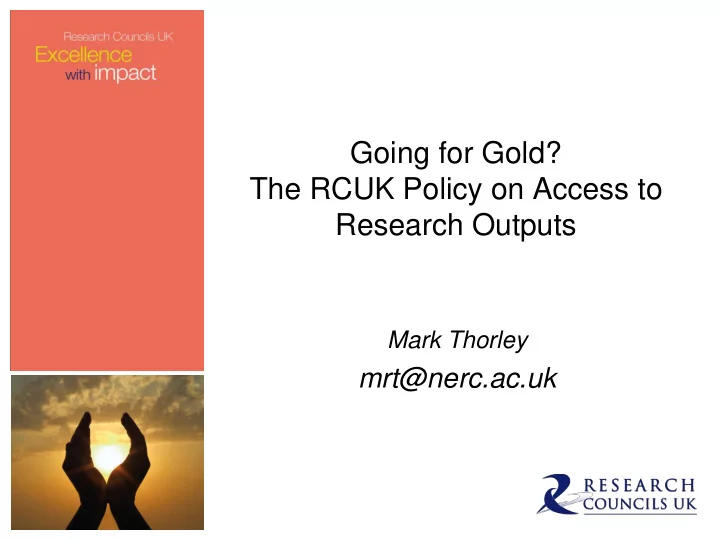

Going for Gold? The RCUK Policy on Access to Research Outputs Mark Thorley mrt@nerc.ac.uk
Summary Why? What? How?
Research Councils UK £11.2B
Why ? Research is essential to the growth, prosperity and wellbeing of the UK. Ensuring the widest possible access to research, both within and outside of the research community, will mean that the ground-breaking discoveries made in science and research can have a greater impact on our lives. Doug Kell, RCUK EG ‘Champion’ for Information, May 2011.
Openness agenda • UK Government’s commitment to openness and transparency. • Make the results of publicly funded research open, accessible and exploitable. • Transparency and openness to drive innovation and growth, and to increase trust in research. • RCUK Position Statement – 2005: – Accessibility; Quality; Efficiency & cost effectiveness; Long-term availability.
Which means …..? • Research outputs must be accessible to enable exploitation. • Research funders have a responsibility to ensure accessibility. • Dissemination is part of the research process and has to be paid for. • Journals, libraries & publishers have a key role to play in the process. Get the stuff out there and get it used!
RCUK Policy on Open Access • Defines what RCUK means by Open Access. • States RCUK’s expectations of Researchers and the publication options available to them. • Sets out criteria for assessing whether any particular Journal complies with the policy. • Applies to all peer-reviewed research publications submitted for publication from 1 st April 2013. Wholly or partial funded by Research Councils.
Transparency requirement • Acknowledgement of funding. • Statement on access to the underlying research materials. • Helps support the transparency, integrity and robustness of the research process. Science’s powerful capacity for self -correction comes from this openness to scrutiny and challenge. Science as an open enterprise Royal Society, June 2012.
RCUK definition of ‘Open Access’ Unrestricted, on-line access to peer reviewed and published scholarly research papers. Specifically a user must be able to do the following free of any publisher-imposed access charge: 1. Read published research papers in an electronic format. 2. Search for and re-use (including download) the content. Allows unrestricted use of manual and automated text and data mining tools, as well as unrestricted re-use of content with proper attribution (as defined by CC-BY).
Journal compliance • Gold with CC-BY. – Or if the publisher will not offer Gold CC-BY then they must offer: • Green (at least post print) with a maximum embargo period of 6(12) months, and CC-BY-NC.
Funding • Research Councils providing funding for APCs through block grants to institutions. • Institutions must establish Publication Funds and the processes and procedures for payment of APCs. • ‘Light touch’ guidance – use the money to best deliver RCUK Policy.
Size of the APC fund • How many publications? – Est. 26k per year, 90% HEI, 10% RC institutes; • Average APC? – Finch £1727 + VAT, paid at 80% fEC = £1658; • Five-year transition period. HEI publications Year-1 Year-2 Year-3 Year-4 Year-5 % Gold 45% 53% 60% 67% 75% No. Gold 10.5k 12.3k 14.0k 15.6k 17.5k APC fund £17M £20M tbc tbc tbc
Distribution of APC fund • Based on % share of direct labour funding received over past 3 years (£1.5B) – DI Staff and DA Investigators • Russell Group & 1994 Group – 37 HEIs, 82% • Cut off below £10k in year-5 (>99%)
Policy in a nut-shell • Authors must publish in a RCUK Open Access compliant journal. • Journal achieves compliance through Gold CC- BY, else Green, 6(12) months, post-print, CC-BY- NC. • RCUK preference is for Gold. However, choice is with Authors and their institutions. • Five year transition to 75% Gold.
Further information • RCUK Policy http://www.rcuk.ac.uk/research/Pages/outputs.aspx • RCUK Blogs http://blogs.rcuk.ac.uk • Finch Group report http://www.researchinfonet.org/wp-content/uploads/2012/06/Finch- Group-report-FINAL-VERSION.pdf • Royal Society Report http://royalsociety.org/policy/projects/science-public-enterprise/report/ openaccess@rcuk.ac.uk
QUESTIONS ?
RCUK Position Statement - 2005 • Four key principles: – Accessibility to publicly-funded research; – Rigorous quality assurance; – Efficient and cost-effective access mechanisms; – Long-term preservation and accessibility of outputs.
RCUK Key Principles • Accessibility to publicly-funded research; – Ideas and knowledge derived from publicly-funded research must be made available and accessible for public use, interrogation and scrutiny, as widely, rapidly and effectively as practicable. • Rigorous quality assurance; • Efficient and cost-effective access mechanisms; • Long-term preservation and accessibility of outputs.
RCUK Key Principles • Accessibility to publicly-funded research; • Rigorous quality assurance; – Published research outputs must be subject to rigorous quality assurance, through effective peer review mechanisms. • Efficient and cost-effective access mechanisms; • Long-term preservation and accessibility of outputs.
RCUK Key Principles • Accessibility to publicly-funded research; • Rigorous quality assurance; • Efficient and cost-effective access mechanisms; – The models and mechanisms for publication and access to research results must be both efficient and cost-effective in the use of public funds. • Long-term preservation and accessibility of outputs.
RCUK Key Principles • Accessibility to publicly-funded research; • Rigorous quality assurance; • Efficient and cost-effective access mechanisms; • Long-term preservation and accessibility of outputs. – The outputs from current and future research must be preserved and remain accessible for future generations.
Recommend
More recommend